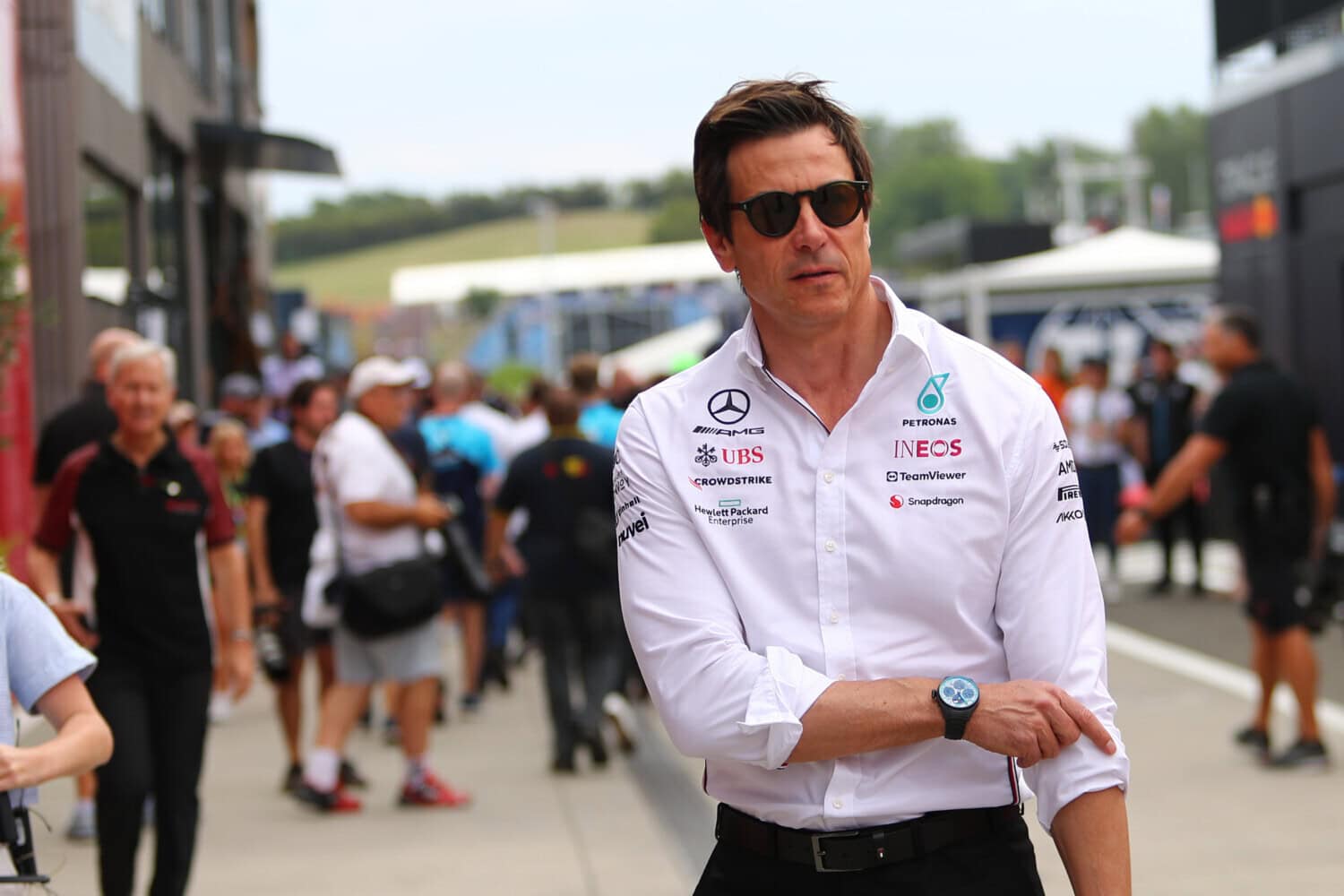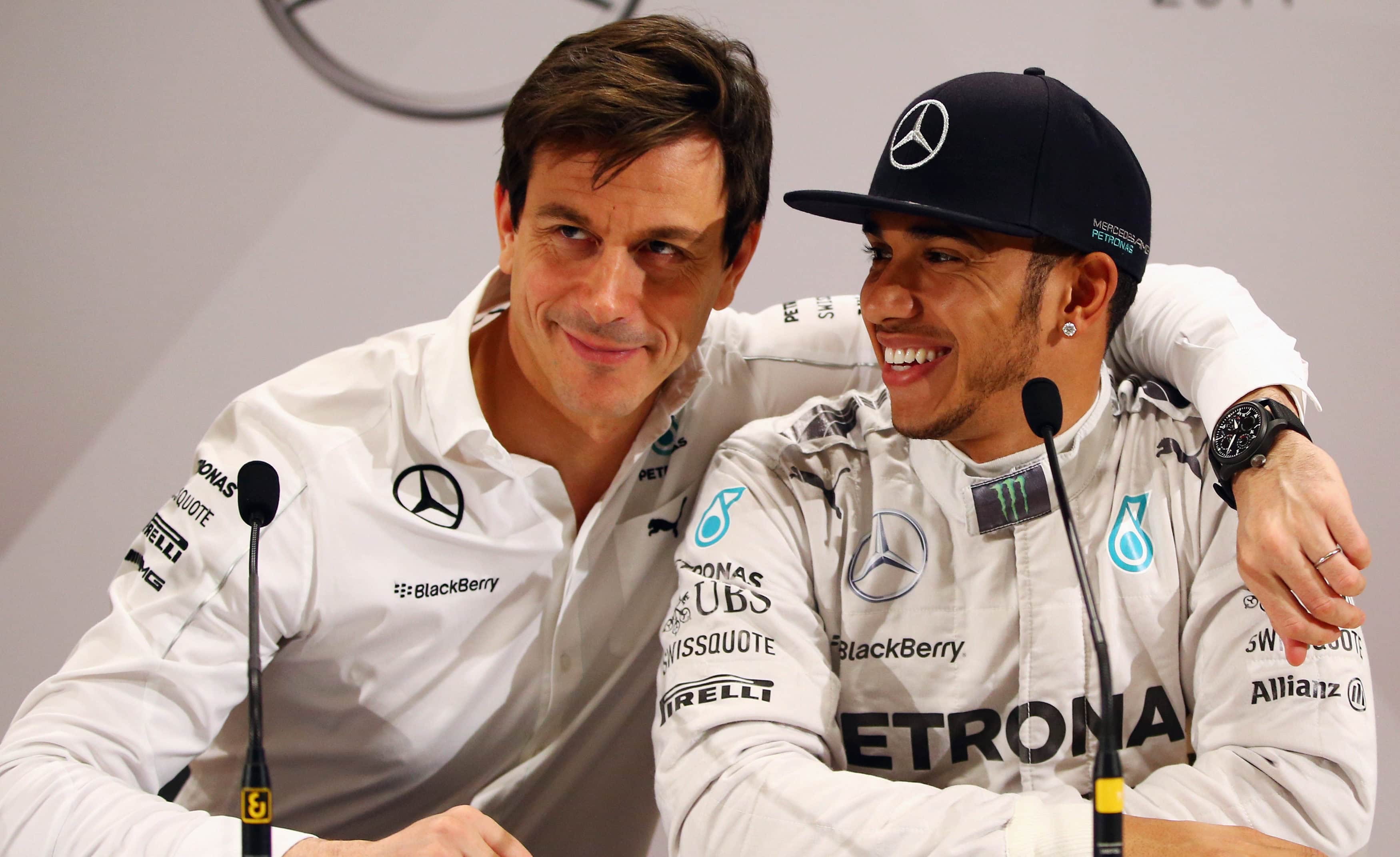The celebrated racing exec speaks with Boardroom on his unique path as an entrepreneur, his relationship with Lewis Hamilton, and getting back to the top of Formula 1.
On a sunny Tuesday in June, Mercedes F1 team principal and CEO Toto Wolff was in a bright and cheery mood despite his Silver Arrows’ up-and-down start to the Formula 1 season.
Mercedes were in a distant second place in the 2023 Constructors’ Standings after drivers Lewis Hamilton and George Russell failed to make the podium in three consecutive races in Azerbaijan, Miami, and Monaco. Things began to turn around on June 4 in Spain, however, when the drivers respectively finished No. 2 and No. 3 behind race winner Max Verstappen.
A week off before the subsequent Canadian Grand Prix in Montreal left time for a media tour in New York, where Wolff found himself in good spirits even when describing his team’s issues in a detailed but blunt manner.
Strolling into Boardroom’s offices in a sharp blazer and jeans, he explained that Mercedes didn’t fully comprehend the root of the issues with its car, which essentially boiled down to an unforeseen aerodynamic phenomenon. After making changes going into offseason testing, the expectation was that a huge step forward was imminent after Verstappen won the last two Drivers’ Championships and his Red Bull Racing team ended Mercedes’ eight-year Constructors’ Championship run.
The team’s tweaks and simulations, however, didn’t translate to the desired results on the track, marking another start to a Formula 1 season in which they had to revisit their fundamental approach to the car as the season carried on.
“There were a few really painful races,” Toto Wolff told Boardroom of the period before Mercedes decided to make what he called a radical concept change, which included a new front suspension, altered bodywork, and a new floor. “Now, we are on an encouraging path, but I wouldn’t want to say now we are out of the woods. But as long as the trajectory goes in the right direction — like an increasing share price, we’re still going to see oscillations up and down during the season. And that’s to be expected.”

As we’ve seen on TV, the 51-year-old Austrian is an intense, driven leader who has overseen several years of winning through a mix of racing acumen and entrepreneurial expertise — so much, in fact, that Forbes estimates Wolff to be worth $1.6 billion thanks to his reported 33% ownership stake in the Mercedes F1 team. Unlike so many in the billionaire class, however, this fortune was self-made.
Growing up, Wolff did not have any family members with financial backgrounds, nor did he come from money. So, when he was coming up as a driver in the Austrian Formula Ford Championship in the early 1990s, he cut his teeth as a dealmaker by putting in personal legwork to find sponsors for his team and its cars.
After his driving career ended, Wolff studied economics and business in Vienna before spending two years in private equity at a bank. He moved on to a steel manufacturing company afterward, but throughout these experiences, it didn’t take long before he knew he wanted to work for himself rather than find himself ordered around by others.
Even at just 24 years old, Toto Wolff was clear that he wanted agency for himself in order to do better for the people who worked with him. Over time, he grew to enjoy the measured risk-taking that proved to be necessary along the way.
In forging a new path forward, Wolff went on to found two investment companies, Marchfifteen in 1998 and Marchsixteen in 2004, both named for the dates on which they were born. Notably, he did so using just his own and his partners’ money rather than managed investors’ funds. As the companies developed, Toto’s investment strategy remained simple. He needs to fundamentally understand what the business is, whether that’s from the product side, the competitive landscape, or the management team’s particular skills.
If there are no red flags, Wolff will consider an investment.
“I consider myself a calculated risk taker, which means that I can cope with the worst outcome,” he said. “It’s something that’s always there and wouldn’t surprise me if it were to happen.”
Wolff said his best and worst business and investment decision was one and the same: What looked like a terrible decision at the time to fund a driving career rather than go into conventional business and earned money paid off handsomely about two decades later.
“Back in the day, my mother or my friends considered a racing career idiotic,” he said. “Many years later, it was the best thing I’ve done because I’ve been in a car, so I understand what the drivers are feeling and thinking. It’s given me an additional angle that not many people in the industry have, having been in a competitive racing situation.”
It should’ve been no surprise given his racing background and investing in what he fundamentally understands that among Wolff’s first landmark investments was an auto parts company HWA AG, which developed and raced Mercedes cars in Germany’s domestic touring series, as well as for its Formula 3 engine program. He also co-founded a racing driver management company before ultimately dabbling in racing again himself even up until 2006, mainly focusing on distance and endurance races.
His uncommon mix of motorsport with private equity expertise led to an introduction with longtime Williams Racing boss Sir Frank Williams. Wolff bought a minority stake in the team in 2009 and was additionally named to its board of directors. He was named Williams’ executive director in 2012 before Mercedes came with the offer to become their team principal and top racing executive a year later.
Most importantly for the bottom line, they offered an ownership stake in the organization as well.
Interestingly enough, Wolff didn’t initially think he’d hold onto his equity or his role with the Silver Arrows long-term, as he had always been one to keep an exit strategy in mind.
“That changed only in the last few years when working in Formula 1 developed from a project mindset, like a trainer or a manager in football, to ‘this is my company,'” Wolff said. “I’m an equal shareholder to Mercedes and [team partner] INEOS, and this is what I’m going to do for a long time.”
Is it a coincidence that Williams’ last F1 race win came when Wolff was in charge in 2012? Is it a coincidence that Mercedes’ record-setting run of success began just a year after Wolff took the reins? Lewis Hamilton happened to join Merc the same year that Wolff did, and the team has enjoyed unprecedented success ever since, smashing numerous milestones regarding total wins, winning streaks, and championships.
Value creation, Wolff added, always follows success. When Mercedes succeeds commercially through sponsors, it’s because of success on the track, great drivers, and the kind of mindset that make aligning with them as brand partners an easy sell — but the reality is that Mercedes is no longer the top team in Formula 1 as the 2023 summer break draws to a close.
And sometimes, Wolff admitted, confronting the reality of consistently lagging well behind Max Verstappen’s furiously fast Red Bull car can be a harsh one.
“It’s not a disaster, but it’s still not where we aim to be,” he said. “From a human standpoint, it’s very difficult because it’s not like you know that in six months we’re going to be competitive, or in a year’s time we’re fighting for a championship. You just need to put one foot in front of the other and try to get back to the summit, while always having this question mark, ‘When is it going to happen?'”
It’s different for Wolff and Hamilton, who won four consecutive Drivers’ Championships from 2017 to 2020, as well as six out of seven, as part of one of the greatest runs in auto racing history. Today, Wolff is seeing what he called a “Lewis 2.0,” a driver who’s reckoning with a prolonged period in which he’s not the best in the world.
“He’s been great,” Wolff said. “He’s been super supportive when the team needed it, and that dynamic goes in both directions. When he’s not great mentally about how the car is going, we try to support him, and when you can see when the engineers didn’t know what to do next on the track on race weekend, it’s he who cheered everybody up and brought the right attitude as a driver.”
Wolff and Hamilton’s relationship off the track has developed over time, building trust based on actions rather than words. While their personalities significantly differ and they’re at different stages of their lives, Hamilton is someone Wolff calls a friend, and one who would be there for him if he needed help.
“We’re both very ambitious and we trust in both our ambition and determination,” Wolff said. “Whether it was a great run or more difficult like now, it’s a partnership that goes beyond the racing side because we are in the same boat. He always says we win and we lose together.”
As Hamilton approaches an expected new contract with Mercedes to keep him in his seat beyond the current campaign, Wolff described the English all-timer as having a great, multi-dimensional personality and the tenacity to match. Despite being arguably the greatest racing driver there’s ever been, Hamilton’s development both on and off the track never stops.
“He’s still able to scrutinize himself every day in order to become a better person, a better racing driver, a better manager, a better entrepreneur, and a better human being,” Wolff said. “People who take it for a fact that ‘This is who I am,’ that’s not his attitude, not his mindset. It’s difficult to actually change your personality or your mindset, values, and learnings, but he does that. He embraces that.”

At 51 and a decade into his Mercedes tenure, there are still a great many things Toto Wolff can accomplish both inside and outside racing if he ever needed another mountain to climb in his already legendary career. For now, he said he’ll remain as team principal as long as he continues contributing to the team’s development.
And as a major shareholder, it’s also his responsibility to make sure the best people are running the organization in all phases beyond simply what fans see on race day.
“If I’m feeling that I’m not the best person anymore for the job, I’m going to try to find someone else,” Wolff said, “and I won’t have any doubt or being in two minds with that. Because if you’re in two minds, that means you have taken the decision already.”
No matter what the future holds, expect Toto Wolff to remain a highly visible equity stakeholder in Mercedes for a long, long time — if you haven’t noticed, owning a piece of an F1 team is pretty good business these days — and while there may be a new generation of executives running Mercedes in 10 years, Wolff said, he’ll always be a functioning member of the team in some capacity.
Yes, his team is in a transitional period away from its run of historic dominance, sitting at a distant No. 2 in the Constructors standings as of this writing, with Hamilton and Russell respectively in fourth and sixth place respectively in the Drivers’ Championship. But Wolff said that he’s always going to give it his all for Mercedes racing as one of the most influential and successful executives in Formula 1 history.
Is there any reason to doubt him?